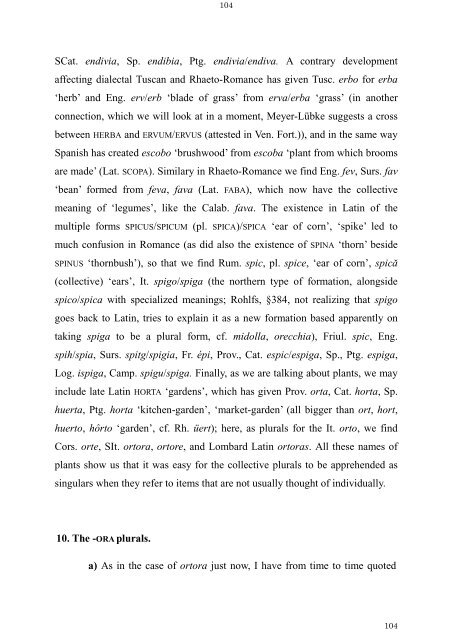The Latin Neuter Plurals in Romance - Page ON
The Latin Neuter Plurals in Romance - Page ON
The Latin Neuter Plurals in Romance - Page ON
Create successful ePaper yourself
Turn your PDF publications into a flip-book with our unique Google optimized e-Paper software.
104<br />
SCat. endivia, Sp. endibia, Ptg. endivia/endiva. A contrary development<br />
affect<strong>in</strong>g dialectal Tuscan and Rhaeto-<strong>Romance</strong> has given Tusc. erbo for erba<br />
‘herb’ and Eng. erv/erb ‘blade of grass’ from erva/erba ‘grass’ (<strong>in</strong> another<br />
connection, which we will look at <strong>in</strong> a moment, Meyer-Lübke suggests a cross<br />
between HERBA and ERVUM/ERVUS (attested <strong>in</strong> Ven. Fort.)), and <strong>in</strong> the same way<br />
Spanish has created escobo ‘brushwood’ from escoba ‘plant from which brooms<br />
are made’ (Lat. SCOPA). Similary <strong>in</strong> Rhaeto-<strong>Romance</strong> we f<strong>in</strong>d Eng. fev, Surs. fav<br />
‘bean’ formed from feva, fava (Lat. FABA), which now have the collective<br />
mean<strong>in</strong>g of ‘legumes’, like the Calab. fava. <strong>The</strong> existence <strong>in</strong> <strong>Lat<strong>in</strong></strong> of the<br />
multiple forms SPICUS/SPICUM (pl. SPICA)/SPICA ‘ear of corn’, ‘spike’ led to<br />
much confusion <strong>in</strong> <strong>Romance</strong> (as did also the existence of SPINA ‘thorn’ beside<br />
SPINUS ‘thornbush’), so that we f<strong>in</strong>d Rum. spic, pl. spice, ‘ear of corn’, spică<br />
(collective) ‘ears’, It. spigo/spiga (the northern type of formation, alongside<br />
spico/spica with specialized mean<strong>in</strong>gs; Rohlfs, §384, not realiz<strong>in</strong>g that spigo<br />
goes back to <strong>Lat<strong>in</strong></strong>, tries to expla<strong>in</strong> it as a new formation based apparently on<br />
tak<strong>in</strong>g spiga to be a plural form, cf. midolla, orecchia), Friul. spic, Eng.<br />
spih/spia, Surs. spitg/spigia, Fr. épi, Prov., Cat. espic/espiga, Sp., Ptg. espiga,<br />
Log. ispiga, Camp. spigu/spiga. F<strong>in</strong>ally, as we are talk<strong>in</strong>g about plants, we may<br />
<strong>in</strong>clude late <strong>Lat<strong>in</strong></strong> HORTA ‘gardens’, which has given Prov. orta, Cat. horta, Sp.<br />
huerta, Ptg. horta ‘kitchen-garden’, ‘market-garden’ (all bigger than ort, hort,<br />
huerto, hôrto ‘garden’, cf. Rh. üert); here, as plurals for the It. orto, we f<strong>in</strong>d<br />
Cors. orte, SIt. ortora, ortore, and Lombard <strong>Lat<strong>in</strong></strong> ortoras. All these names of<br />
plants show us that it was easy for the collective plurals to be apprehended as<br />
s<strong>in</strong>gulars when they refer to items that are not usually thought of <strong>in</strong>dividually.<br />
10. <strong>The</strong> -ORA plurals.<br />
a) As <strong>in</strong> the case of ortora just now, I have from time to time quoted<br />
104









